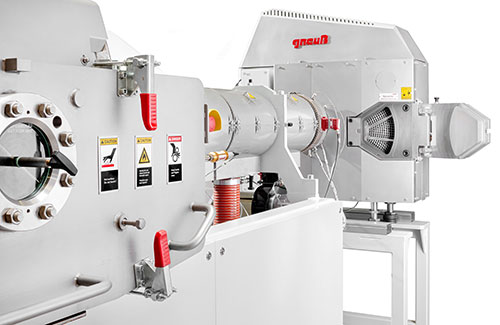Today, plastics processors feel a responsibility toward the environment and are always looking to optimise their production processes with regard to sustainability and energy efficiency. This of course starts with careful use of the resource: plastic. Internal factory waste is seen as a valuable raw material, collected and recycled and in many cases virgin material is replaced as far as possible by secondary, repelletised material.
This also applies to the manufacture of ABS and PS sheet for technical applications. The properties of thermoplastics such as PS and ABS are particularly well suited to recycling.
Melt filtration as the key to increasing the proportion of recycled material
When considering the use of recycled material in a process such as ABS and PS sheet for technical applications, it is important not only to consider the effect of the recycled material on the properties of the product, which has to achieve strict and stringent quality requirements.

The process and the economics of the process itself must not be compromised by down time, variations etc.
The Melt Filtration system is perhaps “the” key to enabling the use of recycled material without compromising production efficiency whilst maintaining the highest possible product quality.
However: whilst the typical screen changers usually supplied as original equipment with extrusion lines are generally acceptable when processing only virgin material, they quickly become a bottleneck in the production process as soon as recycled material is used in any quantity.
A major German manufacturer of PS sheet for thermoforming to technical parts recognised this aspect early and equipped three extrusion lines with Gneuss RSFgenius Melt Filtration Systems. By retrofitting the extrusion lines with these systems, they were able to re-use all their internal waste: not only edge trim but also the skeletal waste and off cuts from the production of the thermoformed parts themselves.
Another well known German manufacturer of ABS and PS sheet for technical applications (e.g. for vehicle interiors) retrofitted their extrusion lines with the Gneuss RSFgenius Melt Filtration System in place of the original equipment screen changer which was supplied with the extrusion line.
When selecting a Melt Filtration System for a given application, it is important to consider not only the ability of the system to handle the contamination load which the recycled material brings – and to achieve the required filtration fineness, but also the impact of the system on the process consistency.
The Gneuss RSFgenius system for example, can operate with a guaranteed pressure consistency of +/- 2 bar even when processing heavily contaminated recycled material. Thanks to the efficient, electronically controlled high pressure purging system, the screen packs can be regenerated in situ up to 400 times. This can mean intervals between screen pack changes of several months (during which the system operates without attention) and replacement of the screen packs takes place without production disturbances.
Most screen changers developed for recycling were developed for repelletising lines, where there are few space constrictions. The Gneuss Rotary Filtration Systems however are compact and designed with retrofitting to existing lines in mind.
Fast return on investment thanks to individually engineered, tailor made solutions
In addition to offering a range of highly efficient, process-constant Melt Filtration Systems, Gneuss also has a team of experienced specialists whose speciality is integrating their systems into existing extrusion lines. In close dialogue with the customer, individual solutions are worked out so that the processor can retrofit a Gneuss system into their existing extrusion line with an absolute minimum of conversion work and disruption, thereby ensuring that the customer can immediately take advantage of the efficiency improvements and a fast return on investment is ensured.
